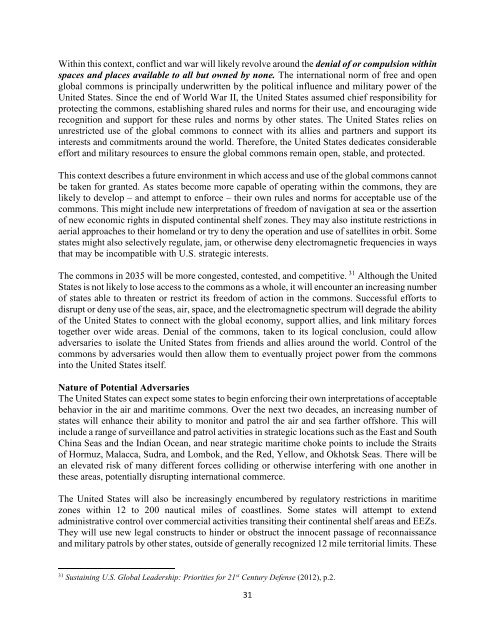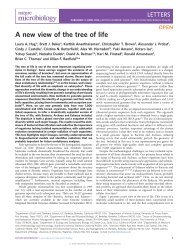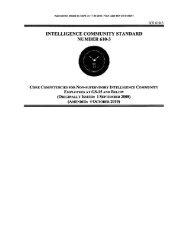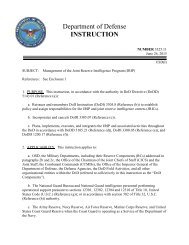The Joint Force in a Contested and Disordered World
JCS-JOE-2035
JCS-JOE-2035
Create successful ePaper yourself
Turn your PDF publications into a flip-book with our unique Google optimized e-Paper software.
With<strong>in</strong> this context, conflict <strong>and</strong> war will likely revolve around the denial of or compulsion with<strong>in</strong><br />
spaces <strong>and</strong> places available to all but owned by none. <strong>The</strong> <strong>in</strong>ternational norm of free <strong>and</strong> open<br />
global commons is pr<strong>in</strong>cipally underwritten by the political <strong>in</strong>fluence <strong>and</strong> military power of the<br />
United States. S<strong>in</strong>ce the end of <strong>World</strong> War II, the United States assumed chief responsibility for<br />
protect<strong>in</strong>g the commons, establish<strong>in</strong>g shared rules <strong>and</strong> norms for their use, <strong>and</strong> encourag<strong>in</strong>g wide<br />
recognition <strong>and</strong> support for these rules <strong>and</strong> norms by other states. <strong>The</strong> United States relies on<br />
unrestricted use of the global commons to connect with its allies <strong>and</strong> partners <strong>and</strong> support its<br />
<strong>in</strong>terests <strong>and</strong> commitments around the world. <strong>The</strong>refore, the United States dedicates considerable<br />
effort <strong>and</strong> military resources to ensure the global commons rema<strong>in</strong> open, stable, <strong>and</strong> protected.<br />
This context describes a future environment <strong>in</strong> which access <strong>and</strong> use of the global commons cannot<br />
be taken for granted. As states become more capable of operat<strong>in</strong>g with<strong>in</strong> the commons, they are<br />
likely to develop – <strong>and</strong> attempt to enforce – their own rules <strong>and</strong> norms for acceptable use of the<br />
commons. This might <strong>in</strong>clude new <strong>in</strong>terpretations of freedom of navigation at sea or the assertion<br />
of new economic rights <strong>in</strong> disputed cont<strong>in</strong>ental shelf zones. <strong>The</strong>y may also <strong>in</strong>stitute restrictions <strong>in</strong><br />
aerial approaches to their homel<strong>and</strong> or try to deny the operation <strong>and</strong> use of satellites <strong>in</strong> orbit. Some<br />
states might also selectively regulate, jam, or otherwise deny electromagnetic frequencies <strong>in</strong> ways<br />
that may be <strong>in</strong>compatible with U.S. strategic <strong>in</strong>terests.<br />
<strong>The</strong> commons <strong>in</strong> 2035 will be more congested, contested, <strong>and</strong> competitive. 31 Although the United<br />
States is not likely to lose access to the commons as a whole, it will encounter an <strong>in</strong>creas<strong>in</strong>g number<br />
of states able to threaten or restrict its freedom of action <strong>in</strong> the commons. Successful efforts to<br />
disrupt or deny use of the seas, air, space, <strong>and</strong> the electromagnetic spectrum will degrade the ability<br />
of the United States to connect with the global economy, support allies, <strong>and</strong> l<strong>in</strong>k military forces<br />
together over wide areas. Denial of the commons, taken to its logical conclusion, could allow<br />
adversaries to isolate the United States from friends <strong>and</strong> allies around the world. Control of the<br />
commons by adversaries would then allow them to eventually project power from the commons<br />
<strong>in</strong>to the United States itself.<br />
Nature of Potential Adversaries<br />
<strong>The</strong> United States can expect some states to beg<strong>in</strong> enforc<strong>in</strong>g their own <strong>in</strong>terpretations of acceptable<br />
behavior <strong>in</strong> the air <strong>and</strong> maritime commons. Over the next two decades, an <strong>in</strong>creas<strong>in</strong>g number of<br />
states will enhance their ability to monitor <strong>and</strong> patrol the air <strong>and</strong> sea farther offshore. This will<br />
<strong>in</strong>clude a range of surveillance <strong>and</strong> patrol activities <strong>in</strong> strategic locations such as the East <strong>and</strong> South<br />
Ch<strong>in</strong>a Seas <strong>and</strong> the Indian Ocean, <strong>and</strong> near strategic maritime choke po<strong>in</strong>ts to <strong>in</strong>clude the Straits<br />
of Hormuz, Malacca, Sudra, <strong>and</strong> Lombok, <strong>and</strong> the Red, Yellow, <strong>and</strong> Okhotsk Seas. <strong>The</strong>re will be<br />
an elevated risk of many different forces collid<strong>in</strong>g or otherwise <strong>in</strong>terfer<strong>in</strong>g with one another <strong>in</strong><br />
these areas, potentially disrupt<strong>in</strong>g <strong>in</strong>ternational commerce.<br />
<strong>The</strong> United States will also be <strong>in</strong>creas<strong>in</strong>gly encumbered by regulatory restrictions <strong>in</strong> maritime<br />
zones with<strong>in</strong> 12 to 200 nautical miles of coastl<strong>in</strong>es. Some states will attempt to extend<br />
adm<strong>in</strong>istrative control over commercial activities transit<strong>in</strong>g their cont<strong>in</strong>ental shelf areas <strong>and</strong> EEZs.<br />
<strong>The</strong>y will use new legal constructs to h<strong>in</strong>der or obstruct the <strong>in</strong>nocent passage of reconnaissance<br />
<strong>and</strong> military patrols by other states, outside of generally recognized 12 mile territorial limits. <strong>The</strong>se<br />
31<br />
Susta<strong>in</strong><strong>in</strong>g U.S. Global Leadership: Priorities for 21 st Century Defense (2012), p.2.<br />
31











